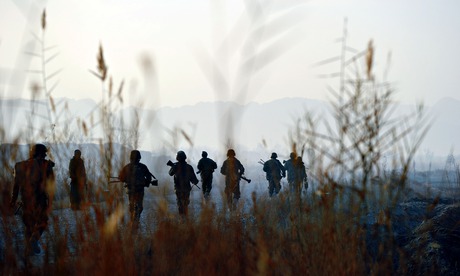
Every Thursday, down a quiet residential street, hundreds of men gather inside a red tent. Here, they turn off their mobile phones and settle down for an afternoon of poetry reading.
In Afghanistan, which has a literacy rate of 28%, poetry and the oral tradition of it has long been part of the culture. Even an illiterate farmer will have a few lines of Rumi, the nation’s preferred scribe, committed to memory. The medium has served as a glue that binds together the ethnicities that make up the modern state of Afghanistan.
The Thursday gatherings were started by Gulnoor Bahman and 10 friends 11 years ago, and now have more than 1,000 members. At half a dozen branches across Afghanistan, enthusiasts get together to recite poems written in the country’s two official languages, Dari and Pashto, as well as lesser known tongues such as Pashayi and Balochi.
But in recent years, the party has got smaller. With the withdrawal of foreign troops, security and economic concerns have been mounting. Leisure activities, such as poetry readings, have been the first to go in families on tight budgets. Many are foregoing the literary communion in favour of staying at home.
Mir Ziahuddin’s day job is as a translator at a hospital north of Kabul. “In Afghanistan, no one helps the poets, so we all have day jobs,” he explained., his gap-toothed smile creating creases along his eyes.
“Poetry is a money losing venture,” chimed in Halahuddin Bahri, whose day job is advising the finance ministry.
Next spring, the foreign-funded hospital where Ziahuddin works will close its doors, and he is unsure what will happen to him, let alone if he will be able to keep up his Thursday tradition. But for now, he continues to make the arduous commute of two, sometimes even three, hours to attend.“When I was a young boy, I fell in love with poetry,” Ziahuddin said. “And since then, whenever I feel that something is wrong with my country, I write it down.”
“ These days,” he added, “ those feelings are mostly sadness.”
His boyhood friends have all moved away, mostly to Iran, Pakistan, the US and the UK. The advent of social media has helped them reconnect, and they share their latest poems on Facebook.
Ziahuddin has written about love and family, but his recent poems have also covered subjects as varied as the last presidential election, the raging insurgency, and a gang rape scandal that rattled the country.
In between drags on his Marlboro cigarettes,
Bahman said five of his children and his wife were living abroad. Asked why, he responded: “To ask why anyone leaves Afghanistan is to ask why anyone would run out of a burning building.”
To mourn their departure, Bahman has written a short poem:
“You are going
I am going
You from this city
I from this world”
Bahman understands that it would be better for him to leave Afghanistan. The country’s fledgling intellectual class did well under the Nato intervention — the country’s arts flourished with the blessing of western donors and their funding. But with the withdrawal of western troops, the sense of immunity that the country’s poets and musicians and other artists have enjoyed is rapidly ebbing away. In a brazen attack earlier this month, a teenage suicide bomber detonated himself during a performance at a French-funded theatre in downtown Kabul. In a statement issued the next day, the Taliban said it would treat “cultural invasions” the same as military invasions.
It went on to condemn members of the civil society and media, accusing them of misleading the youth away from Islam. They appeared to have men like Bahman in mind.
But Bahman remains defiant. “A thousand times they have asked me to join them,” he said, referring to his family abroad, “but my work is here.”
Mujib Mehrdad is another poet whose subjects have evolved to reflect the changing tides of society. His latest collection, named Soldiers, is “about human beings caught in a difficult situation, namely, war.” One is about a Taliban fighter. “He is in a training camp, and there, he thinks himself closer to God. God’s breath touches his hair. He believes all other living beings to be living in sin.”
“Later,” Mehrdad continued, “he is sent out on a suicide mission. On his last day on earth, he sees the petals of a flower quivering in the wind. The beauty of those petals stops him in his tracks, but only for a while. His intentions are too powerful – nothing can prevent him.”
“Nobody wins in a war,” Mehrdad added. “We are all victims when we are on the battlefield.”

